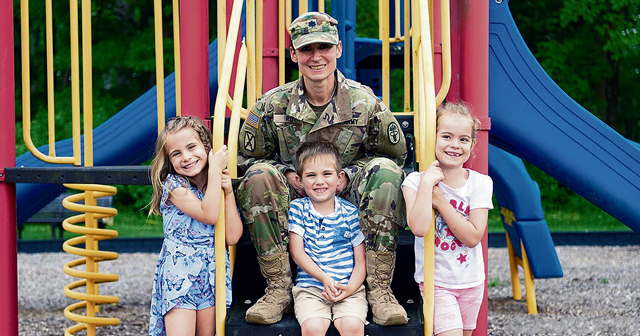
In 1986, then-Secretary of Defense Caspar Weinberger designated April as “Month of the Military Child.” During this month, national, state and local governments, organizations, and agencies, along with military-serving communities, make time to celebrate the important role more than 1.6 million military children play in the Armed Forces community.
Although military children experience many unique and exciting experiences, they also often face many challenges as a result of their parents’ service. Some of these challenges can include moving an average of every two to three years, changing schools, adjusting to separations during parent deployments and other missions, and building new support networks.
Due to these frequent changes, military children can often be faced with celebrating special occasions such as holidays, birthdays, graduations, and other important milestones away from their loved ones. These events not only impact stability but can contribute to feelings of stress, fussiness, sadness, worry and frustration. Other changes that can occur include difficulty concentrating in school, withdrawing from others, differences in eating and sleeping patterns, and negative thinking.
In its 2021 Military Family Lifestyle Survey, Blue Star Families, a military family advocacy organization, found that 17 percent of active-duty respondents reported a child or children who were receiving behavioral [mental] health care. An additional 17 percent of respondents said they would like their children to receive behavioral health care, but they currently do not.
Military children commonly experience adjustment disorders in response to changes in peer relationships, ability to communicate openly with a parent/caregiver, and engagement in positive social activities. Difficulty adjusting to life changes can greatly impact a child’s mood, self-esteem, behavior, academic performance and overall adjustment to a stressor.
Behavioral health intervention strategies that can effectively help military children manage stress include providing healthy outlets for emotions; integrating family, school, and social support; and fostering healthy stress management and coping skills.
Army Lt. Col. Virgil Rivera, a board-certified, licensed clinical social worker with the Defense Centers for Public Health–Aberdeen who specializes in working with children and their families, says it’s important for parents to maintain a healthy and active attachment to their children by spending at least 20 minutes a day with them.
“The time may be spent learning more about their child’s school day, hearing about their friends, or even playing a game together,” said Rivera.
Rivera recognizes that sometimes parents are unable to dedicate this time daily due to military/work obligations or to other family responsibilities; however, it is important to be mindful that the quality of the time spent together fosters a meaningful parent/child relationship with both short- and long-term benefits.
“If a child knows and feels that their parent is available to them, then their experience may also shape their view on how they approach relationships with others and how they view themselves,” said Rivera. “In some ways, parenting is a leadership role where caring behaviors, words, tone and time are foundational to the growth and development of our next generation.”
Military children are known for their strength, dedication and sacrifices. To help build their resilience in response to the expected and unexpected challenges, it is important to equip military children with stress management strategies and healthy coping skills that can help foster positive outcomes. Here are some recommended healthy coping strategies:
Healthy coping skills for kids
- Maintain routines
- Positive affirmations and self-talk
- Healthy expression of feelings – art, writing, talking, laughing, praying, crying
- Relaxation techniques – deep breathing, muscle relaxation, guided imagery
- Physical activity – sports, stretching, yoga
- Mind activities – reading, puzzles, listening to music
Here are some additional resources to help you celebrate Month of the Military Child:
- Military Kids Connect offers engaging tools and games. It also helps children, preteens and teens prepare for the challenges around family transitions.
- The Month of the Military Child Toolkit lists mental health and well-being tools for military children.
- The Military Child Education Commission lists 50 ways to celebrate military children in April.
- Sesame Street for Military Families offers downloadable activities and videos for military children.
- The Defense Centers for Public Health-Aberdeen advances Joint Force health protection with agile public health enterprise solutions in support of the National Defense Strategy.
NOTE: The mention of any non-federal entity and/or its products is for informational purposes only, and not to be construed or interpreted, in any manner, as federal endorsement of that non-federal entity or its products.


